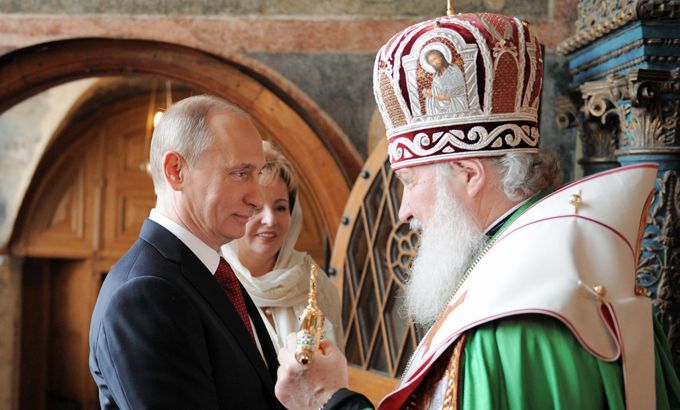
Orthodox corruption?
After decades of suppression, the Russian Orthodox Church appears to be back in favour with the country’s leadership.
Less than three decades ago, it would have been unthinkable for a Russian premier to have exchanged public expressions of solidarity and goodwill with the head of the country’s Orthodox Church.
For years under communism the institution had been suppressed, its priests harassed by the authorities, its churches closed or given over to communal secular pursuits, its devotees scorned for their ‘superstitious’ adherence to doctrines that the state and the party regarded with deep suspicion.
Keep reading
list of 4 itemsMuslim pupil loses UK court bid over Michaela school prayer rituals ban
Photos: Sikhs celebrate harvest festival of Baisakhi, marking new year
Masses gather for Eid celebrations in India
Indeed, the Soviet Union was the first nation to have elimination of religion as an ideological objective and tens of thousands – if not hundreds of thousands – of people paid very dearly for their beliefs as a consequence.
But things have changed. Nowadays the nation’s political leaders and top clerics seem to be building an extraordinarily close relationship. Last week, President Vladimir Putin appeared with the Orthodox Church’s Patriarch Kirill to celebrate the latter’s fourth year of leadership of a religion that is re-establishing its traditional place at the centre of the country’s affairs.
“At the heart of all Russia’s victories and achievements are patriotism, faith and strength of spirit,” said Putin, speaking at a ceremony in the Kremlin. The church, he said, should be allowed more control over aspects of Russian life and “get every opportunity to fully serve in such important fields as the support of family and motherhood, the upbringing and education of children, youth, social development, and to strengthen the patriotic spirit of the armed forces”.
Such sentiments, which are being heard increasingly often these days, are music to the ears of those who hark back to the days when Russia’s particular brand of Christianity was the country’s dominant moral force.
From its foundation in the 10th century when the Orthodox Church broke from Roman Catholicism, its power and influence grew until it became central to the nation’s very identity, synonymous with Holy Mother Russia. Now, its champions will tell you, after the barren wilderness years of Soviet hostility, the Church is merely reclaiming that rightful pre-eminence.
Others are not quite so convinced. Adherents of other religions and committed atheists (and there are still plenty of both in Russia, despite polls which show that almost three-quarters of Russians consider themselves Orthodox) question whether Vladimir Putin’s recent co-joining of Christian values with patriotism actually has more to do with his desire to unify a country where ethnic and political fault lines are beginning to show than with any genuine commitment to spirituality.
Nevertheless, the Church’s top clerics, basking in the warmth of the Kremlin’s new found appreciation, are grateful and happy to reciprocate. Patriarch Kirill has famously likened Putin’s time in power to a “miracle of God”.
And when in the run up to last year’s presidential elections, the female punk band Pussy Riot controversially entered Russia’s Christ the Saviour Church and sang that the Virgin Mary should “throw Putin out”, church leaders were publicly delighted that the government cracked down hard and that the women were given long jail terms.
But there is more to this closeness than just mutual admiration. Physical signs of the Orthodox Church’s resurgence can be found all over Moscow where a massive state-funded programme, worth billions of roubles, to restore hundreds of Orthodox churches is currently underway.
Though the initiative is undoubtedly returning some of the Russian capital’s ancient architectural wonders to their full glittering glory, it has caused some to wonder whether the Church should be choosing its friends more wisely.
Some even talk darkly about corruption, about the less-than-transparent way publicly funded reconstruction projects have been contracted out, about the oddly commercial relationships of certain Church institutions and the controversial use of taxpayers’ money for church related projects in what is still officially a secular country.
People & Power sent filmmakers Simon Ostrovsky and Veronika Dorman to investigate.
The music for this film is from Ed Hicks & The Nightcaps.
 |
People & Power can be seen each week at the following times GMT: Wednesday: 2230; Thursday: 0930; Friday: 0330; Saturday: 1630; Sunday: 2230; Monday: 0930. Click here for more People & Power |